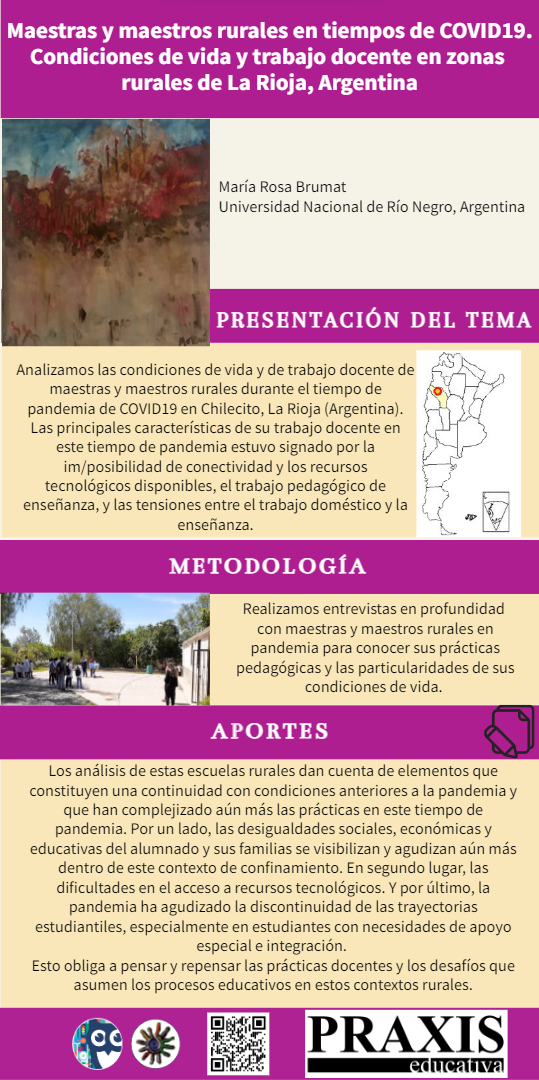Rural teachers in times of COVID19. Living condictions and teaching work in rural areas of La Rioja, Argentina
DOI:
https://doi.org/10.19137/praxiseducativa-2024-280110Keywords:
rural education; pandemic; teachers; domestic work; teachingAbstract
This article reflects on the living and teaching work conditions of rural teachers during the time of the COVID19 pandemic in our country. Some results of a completed research project called “Rural education and education of youth and adults in the province of La Rioja” are included. A case study in the Chilecito Department” with a workplace in the Department of Education and Health Sciences, National University of Chilecito between 2019 and 2022. This research aimed to know the characteristics of educational practices in rural education and of young people and adults in the province of La Rioja, particularly in the Chilecito Department. We understand that in the configuration of these practices, the policies intended for these modalities of the educational system are woven in light of the institutional configurations and the trajectories of the subjects involved.
Downloads
References
Achilli. E. (2009). Escuela, familia y desigualdad social. Una antropología en tiempos neoliberales. Laborde
editores.
Andrade Oliveira, D., Edmilson Pereira, J. y Clementino, A. M. (2021). Trabajo docente en tiempos de
pandemia: una mirada regional latinoamericana. Criatus Design e Editora, IEAL/CNTE/Red Estrado.
Brumat, M. R. (2011). Maestros rurales: condiciones de trabajo, formación docente y práctica cotidiana. Revista
Iberoamericana de Educación, (55).OEI.
Brumat, M. R.y Moreiras, D. A. (2021). Prácticas de enseñanza en la modalidad domiciliaria: cruces con la
educación rural y el uso de Tic. Xihmai, 16(31).
Brumat, M. R. (2023). Diálogos en educación rural y educación de jóvenes y adultos. Editorial Arandú.
Buscaglia, T. (9 de abril de 2021). Coronavirus en la Argentina. El conmovedor esfuerzo de los maestros rurales
para seguir enseñando durante la cuarentena. La Nación.
Butel Pantazzis, E. (2019). Representaciones Sociales Sobre Inclusión Escolar y Trayectorias Estudiantiles en
Escuelas Rurales del Departamento Chilecito. Informe final de Investigación. Secretaría de Ciencia y Técnica,
Universidad Nacional de Chilecito.
Cragnolino, E. y Lorenzatti, M. C. (2003). Formación docente y escuela rural. Dimensiones para abordar
analíticamente esta problemática. Páginas, 2(2 y 3), 63-76. Narvaja Editor.
CTERA. (2020). Encuesta Nacional “Salud y condiciones de trabajo docente en tiempos de emergencia sanitaria
Covid-19”. http://mediateca.ctera.org.ar/items/show/428
De la Fare, M. (2010). Principales ideas, discusiones y producciones en educación de Jóvenes y adultos en
argentina: aportes para una reconstrucción histórica. Ministerio de Educación de la Nación. DINIECE.
Di Piero, E. y Miño, J. (2000). Nivel secundario y pandemia: Un análisis de las propuestas virtuales a nivel
subnacional en clave de desigualdades. En L. Beltramino (Comp.), Aprendizajes y prácticas educativas en las
actuales condiciones de época: COVID-19 (pp. 152-160). Universidad Nacional de Córdoba, Facultad de
Filosofía y Humanidades.
Ezpeleta, J. (1991). Escuelas y Maestros. Condiciones del trabajo docente en la Argentina. CEAL.
Geertz, C. (1987). La interpretación de la Cultura. Gedisa.
IEAL. (2021).Situación laboral y educativa de América Latina en el contexto de la pandemia COVID-19:
Principales tendencias. Internacional de la Educación para América Latina.
Lorenzatti, M. del C. (junio de 2003). Regímenes Especiales: una definición política para la educación de
jóvenes y adultos. Coloquio Nacional A 10 años de la Ley Federal ¿mejor educación para todos? Escuela de
Ciencias de la Educación, Facultad de Filosofía y Humanidades, UNC. Córdoba.
Lorenzatti, M.C., Brumat, M. R. y Beinotti, G. (2014). Políticas de formación docente inicial para educación
rural en Argentina (2007-2013). Revista Iberoamericana de Evaluación Educativa,7(2).
Miranda, R., Bazán C. y Nureña, C. R. (2021). Bienestar docente e impacto de la pandemia de COVID-19 en
escuelas rurales multigrado. Un estudio cualitativo con docentes de tres regiones del Perú.
Pautassi, L. (2021). A un año de la pandemia: Los cuidados en el centro y en los márgenes. Desenvolvimento
em debate, 9(1),213-229.
Rockwell, E. (1987). Repensando institución: una lectura de Gramsci. Documento DIE, Departamento de
Investigaciones Educativas, Centro de Investigación y de Estudios Avanzados del IPN.
Rockwell, E. (1995). De huellas, bardas y veredas. En La escuela cotidiana. Fondo de Cultura Económica.
Rockwell, E. (2005). La apropiación, un proceso entre muchos que ocurren en ámbitos escolares. En Memoria,
conocimiento y utopía. Pomares.
Rockwell, E. (2009). La experiencia etnográfica. Historia y cultura en los procesos educativos. Paidós.

Published
Issue
Section
License
Copyright Notice
Editorial Committee Educational Praxis Magazine:
I hereby declare that I am the author of the article titled (article name), that it is original and my own and that it was not previously published in any other format or medium. I declare to know that the magazine will not charge me any type of fee under any circumstances, nor will I receive any type of monetary compensation If it were accepted for publication in Educational Praxis, I authorize the aforementioned magazine to publish it digitally and to advertise it on its social networks.
If the work is published, I adhere to the Creative Commons license called "Attribution - Non-Commercial Share Alike CC BY-NC-SA", through which it is allowed to copy, reproduce, distribute, publicly communicate the work and generate derivative works, as long as when the original author is cited and acknowledged. This license has been used since September 2018. In 2016 CC BY NC ND 4.0 was adhered to; and in the years 2017 and 2018 (January-August) CC BY NC 4.0.
This CC BY-NC-SA Share Alike license does not, however, permit commercial use of the work. As an author, the journal may establish additional agreements for the non-exclusive distribution of the version of the work published in the journal, it allows me to self-archive the published articles, in their post-print version, in institutional, thematic repositories, personal web pages or any other relevant use. with the recognition of having been first published in this journal.
Educational Praxis adheres to DORA (Declaration on Research Assessment) signed in San Francisco, California, on December 16, 2012, and to the Declaration of Mexico (Joint Declaration LATINDEX - REDALYC - CLACSO - IBICT).














_(1)2.png)


3.png)











_(2).png)






2.jpg)









